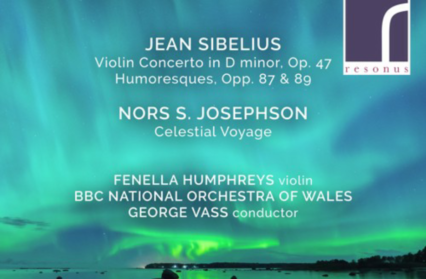David Truslove reviews a timely release from Resonus Classics – a BBC National Orchestra of Wales recording of Jean Sibelius: Violin Concerto, Op. 47 & Humoresques, Opp. 87 & 89, featuring Fenella Humphreys and George Vass.
Should anyone turn to the website for the BBC National Orchestra of Wales seeking information about its recordings, they would be quickly disappointed. Amongst the details one can learn about the orchestra since its formation in 1928 is its established reputation in the recording studio, and that BBC Hoddinott Hall boasts ‘one of the largest purpose-built recording studios in the world’. Further reading points to the orchestra’s award-winning TV soundtracks including Philip Pullman’s His Dark Materials and David Attenborough’s Life Story. Yet no mention is made of the orchestra’s acclaimed discography, including this new Sibelius disc, guest conducted by George Vass, known to many as the Artistic Director of the Presteigne Festival. Discovering the orchestra’s new recordings is a matter of detective work, or in my case, chance.
Under principal conductor Thomas Søndergård (2011-2018), BBC NOW began a Sibelius recording project with Linn Records which produced four symphonies and a handful of tone poems, all securing mostly favourable reviews. That Sibelius had been a preoccupation for conductor and orchestra has more recently borne fruit in the wonderfully transparent playing set down by Resonus Classics for this disc recorded in Hoddinott Hall during January and February 2020. The bulk of the CD is taken up with Sibelius’s Violin Concerto and the Humoresques, and then the world premiere of Celestial Voyage by the Californian-born composer Nors S Josephson. Linking these works is the up-and-coming British violinist Fenella Humphreys who, since winning the BBC Music Magazine Instrumental award in 2018, has been in demand throughout the UK and Europe. I recall hearing her earlier that same year in Cadogan Hall showcasing Stravinsky’s Violin Concerto and was impressed by her commanding technique and security of pitch.
Her playing here is no less distinguished, where she confronts and dispatches the virtuosic demands of each piece with handsome tone, nothing short of pitch perfect and plenty of rapt expression from her Guarneri violin. Fenella Humphreys brings a special grace to the six Humoresques, works that seem a country mile away from the rugged grandeur of the Concerto or the sense of heroic struggle that occupies the symphonies. Premiered in Helsinki in 1919, the Humoresques inhabit a certain melancholy – Sibelius believed them to evoke something of “life’s sorrow lit with rays of sunshine” – yet the music is imbued with a zigeuner-like freshness, regardless that four of these salon-like pieces are in a minor key. Modestly scored for chamber orchestra (strings alone in the central pair), there’s no lack of ambition, each vignette conjuring a specific world, bringing to mind the character portraits within Robert Schumann’s piano music. Of these unjustly neglected miniatures, one disappointed English writer in 1947 commented “none of our leading fiddlers has yet to discover them”. Nearly twenty years later the Sibelius scholar Robert Layton wondered why these works were not in the repertory of every violinist of standing.
That still may be the case today, but Humphreys and the warmly considerate collaborators within the BBC NOW bring considerable finesse to these delightful works, the first captivating for its soulfulness and dancing spontaneity. There’s abundant scintillation in the second, brooding enigmas conspicuously absent here and technical demands seemingly brushed aside. The keening gestures of the third might, in other hands, sound icy, but under Vass are cherished and lead to a witty and whimsical account. The fourth is tender; its “smiling through tears” gratifyingly achieved, and the fifth is a model of refinement, its commodo tempo scrupulously observed. Although no less finely executed, the sixth feels a little sedate, and brings to mind the electricity of Aaron Rosand’s 1969 inimitable rendition on Turnabout. But if you’re looking for eloquence, these performances more than fit the bill. And let’s not ignore the unmistakeable empathy between soloist and these obliging instrumentalists.
This is readily apparent in the focussed energy of the Violin Concerto, where the BBC NOW form an alert partnership with Fenella Humphreys, her flawless technique and sense of poise impressing from the outset. Sweet-toned but never cloying, her violin glows with affection and ardour, the main theme shaped with care, and her two cadenzas variously resolute and gentle. There’s athleticism too, and passagework is dashed off with consummate ease. Throughout, balance and momentum are well judged, Vass astutely integrating climaxes and enabling orchestral timbres to ripen with silky woodwind and briefly sonorous brass. The central Adagio is no less intense (strings providing featherlight-support), and if just shy of sounding laboured, its yearning is well caught. I’ve heard faster Finales (try Christian Tetzlaff’s white knuckle ride on Ondine), but this more measured gallop is not without excitement and favours crisp rhythms and colourful detail, its closing bars tension-filled and satisfyingly rousing.
American musicologist and composer Nors S Josephson (born 1942) provides an atmospheric bonus track. Conceived for orchestra and solo violin in 2019, his Celestial Voyage is a romantically inclined soundscape belonging more to the late 19th century than the present, and bears kinship with the pen of Max Bruch. For all that, it’s an agreeable pièce d’occasion, and if its cadenza tends to dominate the work’s nine minutes, Humphreys brings all her persuasive powers to bear.
Resonus RES10277 was released on 2nd April 2021.
You may also like…
Daniel Jones’ Symphonies Nos. 3 and 5 – David Truslove reviews the latest remastering of Daniel Jones’ work and finds it well served by Lyrita’s continued championing.
David Truslove is a critic and regular contributor to Wales Arts Review.











